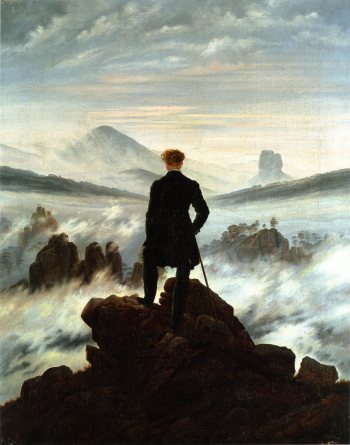No edit summary |
No edit summary |
||
| Line 3: | Line 3: | ||
''Der Wanderer über dem Nebelmeer'' (Wanderer Above the Mist) by Caspar David Friedrich, 1818. Cover image from the 1902 English-language edition of Goethe's ''The Sorrows of Young Werther'', translated by R.D. Boylan, Edited by Nathen Haskell Dole | ''Der Wanderer über dem Nebelmeer'' (Wanderer Above the Mist) by Caspar David Friedrich, 1818. Cover image from the 1902 English-language edition of Goethe's ''The Sorrows of Young Werther'', translated by R.D. Boylan, Edited by Nathen Haskell Dole | ||
My work, an untitled collection of objects, looks to explore ideas surrounding cultural and | My work, an untitled collection of objects, looks to explore ideas surrounding cultural and historic value. The construction of identity, place, politics and economy are implicated, as are references to museology, the Romantic and Classical periods, and contemporary art practice. | ||
The construction of identity, place, politics and economy are | |||
The collection takes form as a series of | The collection takes form as a series of objects made from plaster, paper, and wax, and voice recordings (audible through headphones). The objects include miniature masks taken from statuettes of German cultural figures, as well as traces of other common items and imagery. | ||
At once these objects are | At once, these objects are significant to central Germany and the locality of Weimar, and yet they speak more widely to a negotiation of the dynamics of culture and history. The collection does not seek to fabricate or foster a narrative, instead remaining honest to the abject sense of irony it puts forward. | ||
Revision as of 19:09, 28 January 2013
Der Wanderer über dem Nebelmeer (Wanderer Above the Mist) by Caspar David Friedrich, 1818. Cover image from the 1902 English-language edition of Goethe's The Sorrows of Young Werther, translated by R.D. Boylan, Edited by Nathen Haskell Dole
My work, an untitled collection of objects, looks to explore ideas surrounding cultural and historic value. The construction of identity, place, politics and economy are implicated, as are references to museology, the Romantic and Classical periods, and contemporary art practice.
The collection takes form as a series of objects made from plaster, paper, and wax, and voice recordings (audible through headphones). The objects include miniature masks taken from statuettes of German cultural figures, as well as traces of other common items and imagery.
At once, these objects are significant to central Germany and the locality of Weimar, and yet they speak more widely to a negotiation of the dynamics of culture and history. The collection does not seek to fabricate or foster a narrative, instead remaining honest to the abject sense of irony it puts forward.
